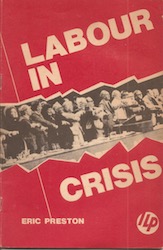When Eric Preston died in September 2020, the ILP lost one of its leading writers and thinkers, a man who – in the words of David Connolly’s obituary – “was ahead of his time” in thinking through the dilemmas and difficulties faced by a Labour left operating within a cautious party and against a capitalist culture.
Since his death, we have been highlighting some of his most significant works and leading writings. (Links to these can be found at the end.) The most important and influential of all was Labour in Crisis, a chunky A5 pamphlet first published in September 1982 and swiftly re-printed in February 1983 with a new foreword by Eric Heffer.
 It captured most clearly, in Preston’s typically dense yet erudite prose, the outlook and approach of the modern ILP, the remains of Keir Hardie’s founding organisation which had re-joined Labour in 1975 after more than four decades in the leftist wilderness.
It captured most clearly, in Preston’s typically dense yet erudite prose, the outlook and approach of the modern ILP, the remains of Keir Hardie’s founding organisation which had re-joined Labour in 1975 after more than four decades in the leftist wilderness.
Forty years after its first appearance we are re-publishing a series of extracts from that pamphlet in downloadable PDF form. We do so as part of our ongoing tribute to Eric, but also because we think much of what he wrote then still has remarkable relevance in today’s much-changed yet little-altered world.
It was written at a time of great social turbulence, in the wake of the ‘winter of discontent’ and 1970s union militancy, of Labour’s electoral demise at the hands of Margaret Thatcher, and the emerging signs of a new Tory radicalism that would later be defined as Thatcherism.
In response to its defeat, Labour had become a party in turmoil, one engaged in a “battle” between left and right, wracked by “internecine strife” and a “right-wing witch hunt”, as then ILP secretary Anne-Marie Graham put it in the pamphlet’s preface.
Much of the left and right seemed to be engaged in a blame game, hurling accusations at each other for the party’s predicament. In Labour in Crisis, Eric sought to do something different, to avoid both the approach of the left, “which forces circumstances to fit into a rigid doctrine”, and that of the right, which “merely results in reacting to events in a pragmatic way”.
As Anne-Marie wrote, Eric “makes the case for tolerance within the boundaries of a democratic constitutional framework in the Labour Party as the main hope for socialist advance”.
“Against the bankruptcy of social democracy on the right and the romantic optimism of much of the left, he sets the ILP’s view of a long haul strategy to root the ideas of socialism in the party, the wider movement and the working class.”
To do this, Eric maintained, we must “occupy the most reasonable ground on the left of the party – and encourage the democratic left and centre to join us, so that together we can establish the Labour Party as an organic link between socialism and the mass movement of the working class.”
It’s a perspective that resonates to this day and has remained at the core of the ILP’s politics ever since, whichever wing of the party has had the upper hand.
Conservative culture
The three extracts we are re-publishing here have been chosen to capture the key ideas behind this approach, ideas based on an understanding of capitalist society, of the role of the Labour Party, and the task of the left.
 The first is taken from the opening section of chapter one in which Eric sets out his view of a how, “in a long established and relatively stable society, with a deep-rooted and well-serviced conservatism, the ideas and values veined throughout the working class are likely to reflect the common conservative culture of that society.”
The first is taken from the opening section of chapter one in which Eric sets out his view of a how, “in a long established and relatively stable society, with a deep-rooted and well-serviced conservatism, the ideas and values veined throughout the working class are likely to reflect the common conservative culture of that society.”
It is from this basis that he goes on to critique the over-optimism of the Labour left, which fails to recognise how this culture influences social and political attitudes, and the excessive pragmatism of the right, which refuses to believe such attitudes or the culture itself can be changed through political agency and argument.
The second extract, also from chapter one, encapsulates Eric’s approach to class conflict, setting out what he sees as the importance and limits of “trade union economism and industrial unrest”.
While sometimes important for politicisation, such action is not “synonymous with a strategy for socialist transformation”, he said. That requires a movement more widely engaged in people’s lives, and a Labour Party that not only wins elections but acts as “a vehicle for socialism”.
“To do this,” he wrote, “the left have to undertake the ambitious task of developing credible policies that can expect to get more than a toe-hold in the community; policies capable of implementation; policies that will promote the well-being of working people and, at the same time, sustain socialist ideas and propel us towards the transformation of our society.”
For the third extract, we are presenting the entire final chapter. Entitled ‘The Alternatives: Co-existence or the Surgeon’s Knife’, it casts an eye over Labour’s internal conflicts of the early 1980s, its deep and damaging post-defeat rows, the rise of the Social Democratic Party, and the emergence of ultra-left Labour factions such as the Militant Tendency.
The question Eric grapples with is one still hugely relevant to the party now – how to “agree on some constitutional arrangements that will facilitate the co-existence of opposed and hostile opinion”.
“We have to develop democratic means for conducting debates, containing the conflict and determining which policies and what personnel will at any time be predominant,” he writes. “No side can expect to get away with a party structure that is rigged to the disadvantage of others.”
It is only out of such a tolerant, democratic co-existence, he says, that the left can push against the right’s electoral expediency and, at the same time, seek to make Labour “a hegemonic force” for change.
Forty years later, it’s a message that remains as urgent as ever.
We hope you find these extracts interesting and relevant. We’d love to hear your thoughts via the Comment box below or on our social media channels.
This article is published in memory of Eric Preston, 1932-2020.
—-
Labour in Crisis – extract 1 is available here.
Labour in Crisis – extract 2 is available here.
Labour in Crisis – extract 3 is available here.
If you’d like to read the whole of Labour in Crisis, there are still a few copies available. Contact us on info@independentlabour.org.uk for details.
Also see: ‘As He Saw It’, presenting Eric Preston’s 2012 article on the impact of the financial crash, the demise of New Labour and the rise of austerity.
And: ‘New Labour & the Democratic Bridge’, Eric’s 1995 response to the rise of New Labour.
‘Eric Preston: The ILP’s Optimistic Pessimist’ by David Connolly is here.



28 March 2023
Those born the year Thatcher came to power are now 43; they are parents. Thatcherite values are normative because the left has provided no counter-narrative – tax as investment in your country; bias in the media; ‘human nature’ as co-operative as much as competitive.
Time and time again we have been shown that there is no avoiding the need for this. We need socialists, not just Labour voters in the marginals. Is it time for a reactivation of the ILP’s ethical socialism?